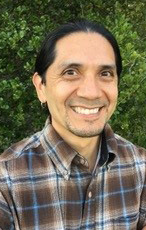STEM Ed PaCER fellow Salvador Huitzilopochtli receives grant in support of equitable math learning research
By Kristina Beatty
 In April 2024, the National Academy of Education announced the Equity in Math Education Research Grants (EMERG) Program to support ten early career research grants for research projects that address the foundations in an equitable math learning experience for K-12 learners with particular focus on populations who have historically been excluded from these opportunities, including learners from African-American, Latine and Indigenous communities.
In April 2024, the National Academy of Education announced the Equity in Math Education Research Grants (EMERG) Program to support ten early career research grants for research projects that address the foundations in an equitable math learning experience for K-12 learners with particular focus on populations who have historically been excluded from these opportunities, including learners from African-American, Latine and Indigenous communities.
Among the grant recipients, or EMERG Scholars, is Salvador Huitzilopochtli, post-doctoral fellow at Advancing STEM Education through Participatory and Community-Engaged Research (STEM Ed PaCER), a collaborative program between MSU, State University of New York-Environmental Science and Forestry, and College of Menominee Nation with the overarching objective to develop leaders in STEM+ education who champion equity and community-engaged scholarship.
This grant will support Huitzilopochtli’s development of research ideas, concepts and theories related to equitable math education. As part of the EMERG Program, these research ideas are presented to mid-career senior scholars and researchers for the purpose of honing and refining those lines of inquiry. The work of the collective EMERG Scholars will help formulate a framework for mathematics education in K-12 that addresses the needs of all students, but with particular emphasis on underserved populations.
Through this grant work, which will be conducted from his home community in California, Huitzilopochtli will bring even greater insight into the community-engaged research that he identifies as the “windows and mirrors” available to instructors and students that help create identity- and culture-centered learning experiences in the math classroom.
Barriers to success
Math courses, and other STEM courses in K-12 and higher education, often serve as gatekeeper courses with disproportionate impact on the future success of historically marginalized and underrepresented students. And historically success in the mathematics classroom has often been defined by how quickly a student can raise their hand and answer a question. “That type of a narrow opportunity to participate really locks out a lot of students,” explained Huitzilopochtli. “If you're not the fastest, and if you’re called upon and don't have the correct answer, you're probably not going to be viewed as capable.”
Huitzilopochtli’s grant proposal, “Constructing Arguments Together: Redefining Participation in Mathematical Argument,” aims to address teacher professional development and classroom programs using a framework that provides understanding in how learning happens within heritage Indigenous communities from North America with autonomy and agency at the forefront.
“For that proposal, the idea was that we could align the ways that classrooms are organized with the actual cultural backgrounds reflected by the students in the rooms. I was thinking about it in terms of students having opportunities to pitch into more communal projects and using certain frameworks that would support that kind of participation,” said Huitzilopochtli.
Huitzilopochtli has two primary aims for this research: provide greater opportunity for students to participate in the math classroom while also providing educators with an anticolonial approach to help rethink the mathematics classroom and break down the ways of thinking, systems and value statements that have seeped deeply into how students are seen as successful, particularly those from underserved communities.
In this approach, changing the environment rather than trying to change the student will improve student opportunities to participate in the classroom, ultimately improving their overall success in mathematics and beyond. These methods of teaching can ultimately then begin to influence how STEM disciplines across levels engage students in the classroom.
“For me,” said Huitzilopochtli, “the important part of this project is building classrooms or even just conceptualizing classrooms where students can show up and be appreciated as their full selves and be able to engage in the work with their full self because math is hard. And if you don't have access to all your resources and every tool available to you, not just intellectual tools but cultural and linguistic tools, it's that much harder.”
Advancing the work
In looking ahead, Huitzilopochtli is on a two-year timeline for his grant work. The ten EMERG Scholars convened in April 2024 where approaches and ways to hone his research were suggested, “I’m going to be starting with the families and get the family input and family framing – that is some of the feedback I’ve received,” he said.
Since that meeting, Huitzilopochtli has secured permission from a local school district and the site administrator to move forward with his research into the math classroom spaces. One participant teacher has been recruited, with more on the horizon. He is in the early stages of observations and field notes, with community events and research activities for the remaining school year outlined. Additional meetings with EMERG Scholar cohort in October have also further helped clarify his primary research questions and the best methods for collecting and analyzing the data he receives during observations and field work.
Above all for Huitzilopochtli, being an EMERG Scholar has provided, “an intergenerational community of educators that has changed the way I approach this work. I’m a part of something much bigger that seeks a good, equitable math education for all, and we can walk there together.” All of which will contribute to cultivating socially conscious STEM+ leaders now and into the future.
To learn more about the NAEd’s EMERG Program and timeline visit naeducation.org/emerg-program-home-page. MSU’s STEM Ed PaCER can be found at stemedpacer.hcommons.org.